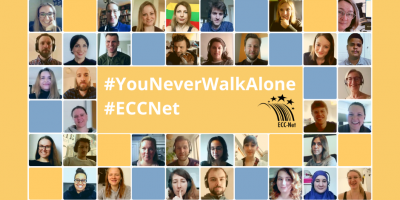Should this nevertheless occur, there is a support centre for victims in every EU Member State. In Austria, we – the European Consumer Centre – have been performing this task since its introduction in 2018. You can read about what this entails in our article 7 important questions about geo-blocking. We achieve solutions out of court through mediation and our services are free of charge for you. The easiest way to request our support is via our complaint form. We handle your case individually with the aim of finding a satisfactory solution for you personally.
Apart from this, those affected can also take action against the company with the help of the authorities. This may enable you to have penalties imposed on the company. This gives enforcement authorities a special role in enforcing the regulation. As an injured party, you can either
- contact the Federal Office of Weights and Measures (BEV)
- or the magistrates (or the respective district administration in the federal states).
Which authority is responsible for my case?
The BEV
is the central point of contact for infringements that have cross-border implications within the EU and fall within the scope of the Consumer Authorities Cooperation Act (VBKG). This primarily concerns collective interests, i.e. the protection of a large number of consumers.
You should contact the BEV if:
- Geoblocking violation: An online shop from another EU country discriminates against you on the basis of your place of residence or nationality (e.g. by redirecting you to a more expensive country-specific site or blocking your access).
- Cross-border unfair commercial practice: A company from another EU country engages in misleading advertising, aggressive business practices or other unfair practices that harm not only you but many consumers.
- Other violations under the VBKG: The BEV is also responsible for other areas such as general price labelling, e-commerce and package travel, provided that these cases are cross-border.
In such cases, the BEV can take the necessary steps within the framework of the EU-wide network of consumer authorities (CPC Network) to put an end to the infringement. However, the BEV cannot take individual legal action on your behalf as a private individual. The aim is rather to solve the problem on a larger scale and to ensure compliance with the regulation for everyone. The support provided by the BEV is therefore advisory and mediating in nature and serves to ensure compliance with the regulation and to find a solution to your case without acting directly as your personal lawyer.
The magistrate (or district administration in the federal states)
on the other hand, is generally responsible for enforcing national laws that affect local matters. If necessary, injured parties must contact these enforcement agencies themselves, for example if:
- Violation of the Price Marking Act: A local shop or Austrian company does not correctly indicate the prices of goods or services.
- Problems in the food sector: This includes violations of food safety and consumer protection laws. In Vienna, for example, the Market Office (MA 59) is responsible for this.
- General commercial law violations: A business in your district does not comply with the provisions of the Trade Regulation Act.
However, the Magistrates are not responsible for helping you with purely civil law disputes with a trader (e.g. warranty claims or withdrawal from a purchase contract). In such cases, consumer protection organisations such as the Association for Consumer Information (VKI) or the European Consumer Centre (ECC) in Austria, or in serious cases a court, are the right points of contact.










